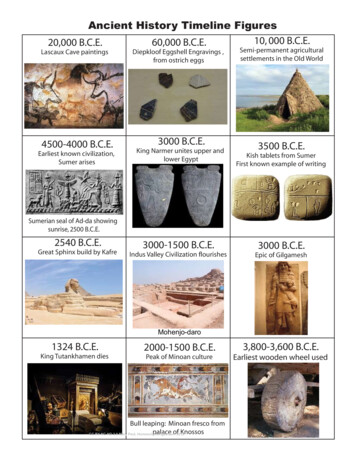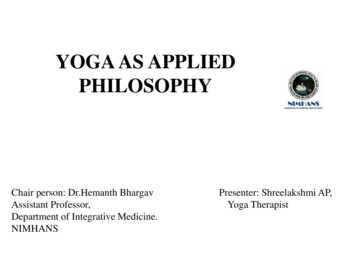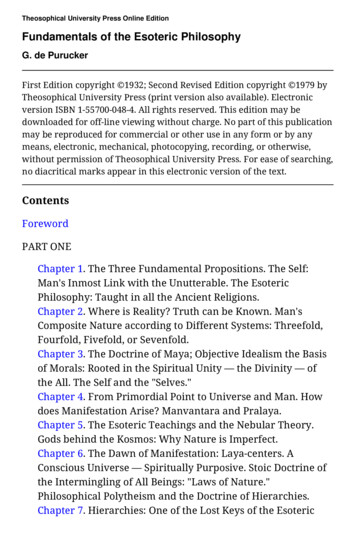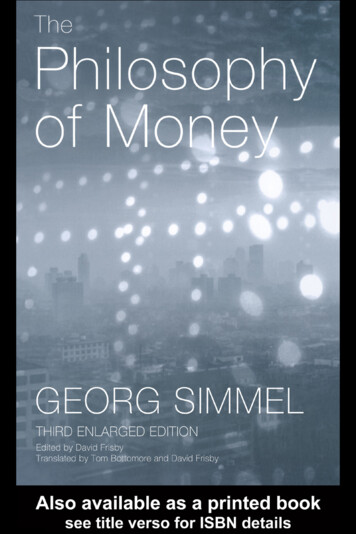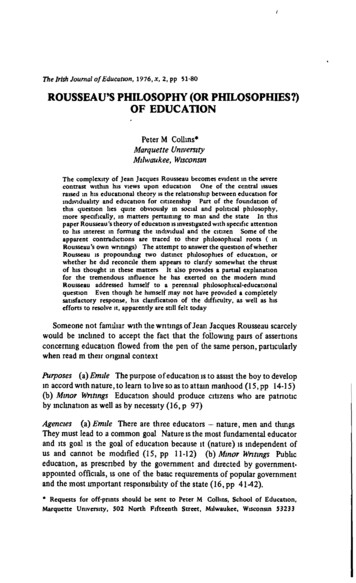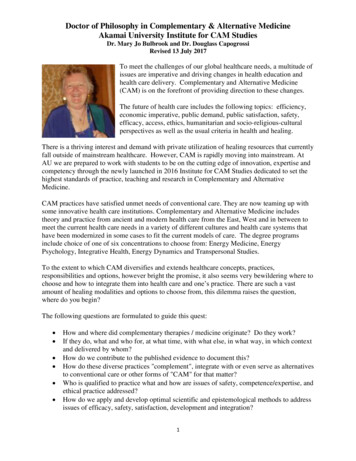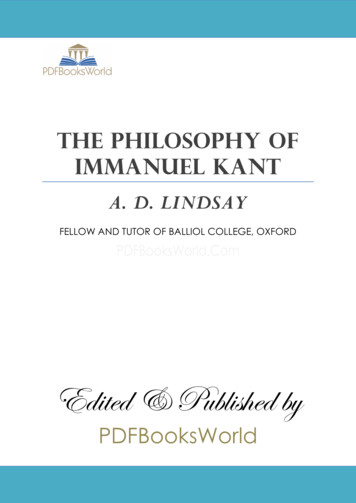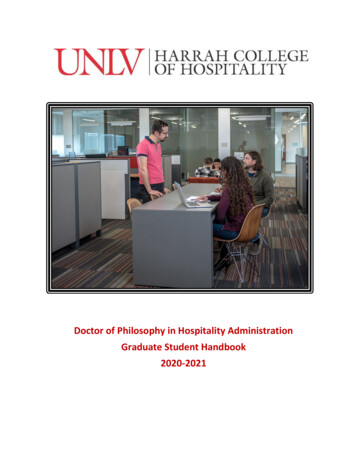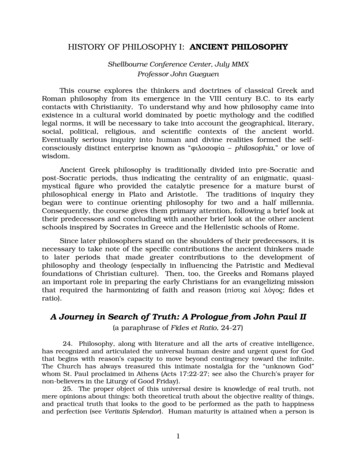
Transcription
HISTORY OF PHILOSOPHY I: ANCIENT PHILOSOPHYShellbourne Conference Center, July MMXProfessor John GueguenThis course explores the thinkers and doctrines of classical Greek andRoman philosophy from its emergence in the VIII century B.C. to its earlycontacts with Christianity. To understand why and how philosophy came intoexistence in a cultural world dominated by poetic mythology and the codifiedlegal norms, it will be necessary to take into account the geographical, literary,social, political, religious, and scientific contexts of the ancient world.Eventually serious inquiry into human and divine realities formed the selfconsciously distinct enterprise known as “φιλοσοφία – philosophia,” or love ofwisdom.Ancient Greek philosophy is traditionally divided into pre-Socratic andpost-Socratic periods, thus indicating the centrality of an enigmatic, quasimystical figure who provided the catalytic presence for a mature burst ofphilosophical energy in Plato and Aristotle. The traditions of inquiry theybegan were to continue orienting philosophy for two and a half millennia.Consequently, the course gives them primary attention, following a brief look attheir predecessors and concluding with another brief look at the other ancientschools inspired by Socrates in Greece and the Hellenistic schools of Rome.Since later philosophers stand on the shoulders of their predecessors, it isnecessary to take note of the specific contributions the ancient thinkers madeto later periods that made greater contributions to the development ofphilosophy and theology (especially in influencing the Patristic and Medievalfoundations of Christian culture). Then, too, the Greeks and Romans playedan important role in preparing the early Christians for an evangelizing missionthat required the harmonizing of faith and reason (πίστις καί λόγος; fides etratio).A Journey in Search of Truth: A Prologue from John Paul II(a paraphrase of Fides et Ratio, 24-27)24. Philosophy, along with literature and all the arts of creative intelligence,has recognized and articulated the universal human desire and urgent quest for Godthat begins with reason’s capacity to move beyond contingency toward the infinite.The Church has always treasured this intimate nostalgia for the “unknown God”whom St. Paul proclaimed in Athens (Acts 17:22-27; see also the Church’s prayer fornon-believers in the Liturgy of Good Friday).25. The proper object of this universal desire is knowledge of real truth, notmere opinions about things: both theoretical truth about the objective reality of things,and practical truth that looks to the good to be performed as the path to happinessand perfection (see Veritatis Splendor). Human maturity is attained when a person is1
able to distinguish the true from the false, not by turning inward, but by opening tothe transcendent.26. Doubts occasioned by the experience of suffering and of apparentlyinexplicable facts, together with the absolute certainty of death as somethinginevitable, give rise to the most basic and unavoidable of all questions: What is themeaning and destiny of life? The death of Socrates, for example, gave to philosophyone of its most decisive orientations by posing the dramatic question of humanimmortality: Is there an afterlife or not?27. Ever since then, philosophers have sought to discover and articulate oneultimate answer, a universal and final explanation, a certitude beyond all doubt thatcan serve as a ground of all partial truths, a supreme value that refers to nothingbeyond itself and puts an end to further questioning. This search is encountered inpersonal “philosophies” of life, as well as in the various systems and schools ofthought.B. The Different Faces of Human Truth28. Man defined as "the one who seeks truth" can never ground his life ondoubt, uncertainty, or deception; in spite of the natural limitations of reason, theinconstancy of the heart, and a tendency to flee from it out of fear of its demands,truth always influences human life, even if it is often obscured, distorted, and evaded.29. Everyday life confirms the fact that men can arrive at the truth. The searchfor it is deeply rooted in human nature and presumes an initial confidence in thepossibility of completing it: The intuition that an answer awaits us is what leads toasking the first question, both in the persistent quest for scientific explanations ofphenomena and with respect to the fundamental or ultimate questions to which manymen have attained substantially the same answers.30. Truth is accessible through evidence and experimentation (both in everydaylife and in scientific research), through exercise of the speculative powers of theintellect (in philosophy), and through religious traditions. Together, these modes ofknowing enable everyone to develop his own comprehensive view of life as a guide tointerpreting its meaning and regulating behavior. .33. In sum, the human search for truth can end only in reaching the Absolute,because it is ultimately the search for a Person to whom we can entrust ourselves insincere friendship (n. 28: This theme, long developed by the Pope, is succinctlyexpressed in the General Audience of 19 Oct. 1983). Moving beyond simple belief,Christian Faith offers the possibility of reaching the goal because it immerses us in theorder of Grace, wherein we can share in the Mystery of Christ and through it a trueand coherent knowledge of the Triune God. All of this is impeded by the contemporaryclimate of suspicion and distrust, which ignores the ancient wisdom about friendshipas the best context for philosophical inquiry. .35. These broad considerations have prepared us to explore more directly therelationship between the two orders of knowledge, revealed truth and philosophy--firstby examining the links between them in the course of history.Course Outline2
1 – Introduction to the History of Philosophy. Its relevance as a philosophicaldiscipline; its relationship to other philosophical disciplines that study humanculture, science, morality, religion; its division into specific historical periods;its treatment of specific thinkers, schools, systems of thought; its criticalcomponent, with reference to the truth of knowledge accessible to humanreason.2 – Introduction to ancient philosophy. Its significance in the history ofphilosophy and world history; its division into specific sub-periods; the GrecoRoman or Classical period as historical and cultural concept; conditionsfavorable for the emergence of philosophy in ancient Greece; brief comparisonwith more ancient oriental schools of thought; overview of course materials andprocedure.PART I: PRE-SOCRATIC PHILOSOPHY3 – Four centuries from Hesiod to Socrates. Asia Minor: Ionian speculators(Thales, Anaximander, Anaximenes); Xenophanes and Heraclitus—earlyphysical and metaphysical problems; Mediterranean Europe: the Pythagoreansand Empedocles; the Eleatics (Parmenides and Zeno)—mathematical andepistemological problems; the first Athenian philosophers: Anaxagoras and theAtomists—Leucippus, Democritus—early skepticism and pluralism.4 – Socrates and his milieu in the Athens recorded by Thucydides. The turnfrom speculation about the macrocosm of physical nature to the microcosm ofhuman nature: the Sophists and their schools of rhetoric (Protagoras, Gorgias);how Socrates did philosophy (dialogical challenges to sophistic relativism andutilitarianism in the search for truth); the opposition aroused by thisrevolutionary new beginning; introducing four centuries of Socratic influence.PART II: POST-SOCRATIC PHILOSOPHY—PLATO AND ARISTOTLE5 – Students of Socrates, Plato chief among them. The trial and death ofSocrates and its impact on his followers; the Socrates of the early Platonicdialogues; contrasting portraits of Socrates by Aristophanes and Xenophon; thefriends and enemies of Socrates in the history of philosophy.3
6 – Emergence of Plato’s philosophical vocation and the story of his career.Traveler and seeker after knowledge; an autobiographical account: the SeventhLetter; Plato’s school: an Academy for the philosophical formation of statesmen;Plato’s teaching method and concept of philosophy (διαλεκτική) as quest for the(είδος) of each thing: what is serious and what is playful in Plato’s“philosophical poetry.” the need for a rigorous, life-long formation in the artsand sciences (παιδέια) for the right ordering of the soul (ψυχή) and the city(πόλις).7 – The sum of Platonic philosophy and its subsequent influence.Inmathematics, logic and epistemology; in metaphysics, cosmology andpsychology; in anthropology, ethics and politics; in rhetoric, aesthetics andtheology; the leading disciples of Plato and the subsequent career of theAcademy; Plato’s influence on early Christianity and throughout the history ofphilosophy; “Platonism” and “Neo-Platonism.”Reading: Plato, Gorgias (trans. Benjamin Jowett), the opening dialogue:CALLICLES: The wise man, as the proverb says, is late for a fray, but not for a feast.SOCRATES: And are we late for a feast?CALLICLES: Yes, and a delightful feast; for Gorgias has just been exhibiting to us many finethings.SOCRATES: It is not my fault, Callicles; our friend Chaerephon is to blame; for he would keep usloitering in the Agora.CHAEREPHON: Never mind, Socrates; the misfortune of which I have been the cause I will alsorepair; for Gorgias is a friend of mine, and I will make him give the exhibition again either now,or, if you prefer, at some other time.CALLICLES: What is the matter, Chaerephon — does Socrates want to hear Gorgias?CHAEREPHON: Yes, that was our intention in coming.CALLICLES: Come into my house, then; for Gorgias is staying with me, and he shall exhibit toyou.SOCRATES: Very good, Callicles; but will he answer our questions? for I want to hear from himwhat is the nature of his art, and what it is which he professes and teaches; he may, as you(Chaerephon) suggest, defer the exhibition to some other time.CALLICLES: There is nothing like asking him, Socrates; and indeed to answer questions is apart of his exhibition, for he was saying only just now, that any one in my house might put anyquestion to him, and that he would answer.SOCRATES: How fortunate! will you ask him, Chaerephon —?CHAEREPHON: What shall I ask him?SOCRATES: Ask him who he is.CHAEREPHON: What do you mean?SOCRATES: I mean such a question as would elicit from him, if he had been a maker of shoes,the answer that he is a cobbler. Do you understand?CHAEREPHON: I understand, and will ask him: Tell me, Gorgias, is our friend Callicles right insaying that you undertake to answer any questions which you are asked?4
GORGIAS: Quite right, Chaerephon: I was saying as much only just now; and I may add, thatmany years have elapsed since any one has asked me a new one.CHAEREPHON: Then you must be very ready, Gorgias.GORGIAS: Of that, Chaerephon, you can make trial.POLUS: Yes, indeed, and if you like, Chaerephon, you may make trial of me too, for I think thatGorgias, who has been talking a long time, is tired.CHAEREPHON: And do you, Polus, think that you can answer better than Gorgias?POLUS: What does that matter if I answer well enough for you?CHAEREPHON: Not at all—and you shall answer if you like.POLUS: Ask:—CHAEREPHON: My question is this: If Gorgias had the skill of his brother Herodicus, whatought we to call him? Ought he not to have the name which is given to his brother?POLUS: Certainly.CHAEREPHON: Then we should be right in calling him a physician?POLUS: Yes.CHAEREPHON: And if he had the skill of Aristophon the son of Aglaophon, or of his brotherPolygnotus, what ought we to call him?POLUS: Clearly, a painter.CHAEREPHON: But now what shall we call him — what is the art in which he is skilled.POLUS: O Chaerephon, there are many arts among mankind which are experimental, and havetheir origin in experience, for experience makes the days of men to proceed according to art, andinexperience according to chance, and different persons in different ways are proficient indifferent arts, and the best persons in the best arts. And our friend Gorgias is one of the best,and the art in which he is a proficient is the noblest.SOCRATES: Polus has been taught how to make a capital speech, Gorgias; but he is not fulfillingthe promise which he made to Chaerephon.GORGIAS: What do you mean, Socrates?SOCRATES: I mean that he has not exactly answered the question which he was asked.GORGIAS: Then why not ask him yourself?SOCRATES: But I would much rather ask you, if you are disposed to answer: for I see, from thefew words which Polus has uttered, that he has attended more to the art which is called rhetoricthan to dialectic.POLUS: What makes you say so, Socrates?SOCRATES: Because, Polus, when Chaerephon asked you what was the art which Gorgiasknows, you praised it as if you were answering some one who found fault with it, but you neversaid what the art was.POLUS: Why, did I not say that it was the noblest of arts?SOCRATES: Yes, indeed, but that was no answer to the question: nobody asked what was thequality, but what was the nature, of the art, and by what name we were to describe Gorgias. AndI would still beg you briefly and clearly, as you answered Chaerephon when he asked you at first,to say what this art is, and what we ought to call Gorgias: Or rather, Gorgias, let me turn to you,and ask the same question—what are we to call you, and what is the art which you profess?GORGIAS: Rhetoric, Socrates, is my art.SOCRATES: Then I am to call you a rhetorician?GORGIAS: Yes, Socrates, and a good one too, if you would call me that which, in Homericlanguage, ‘I boast myself to be.’SOCRATES: I should wish to do so.GORGIAS: Then pray do.SOCRATES: And are we to say that you are able to make other men rhetoricians?GORGIAS: Yes, that is exactly what I profess to make them, not only at Athens, but in all places.5
SOCRATES: And will you continue to ask and answer questions, Gorgias, as we are at presentdoing, and reserve for another occa
PLATO AND ARISTOTLE 5 – Students of Socrates, Plato chief among them. The trial and death of Socrates and its impact on his followers; the Socrates of the early Platonic dialogues; contrasting portraits of Socrates by Aristophanes and Xenophon; the friends and enemies of Socrates in the history of philosophy. 4 6 – Emergence of Plato’s philosophical vocation and the story of his career .

